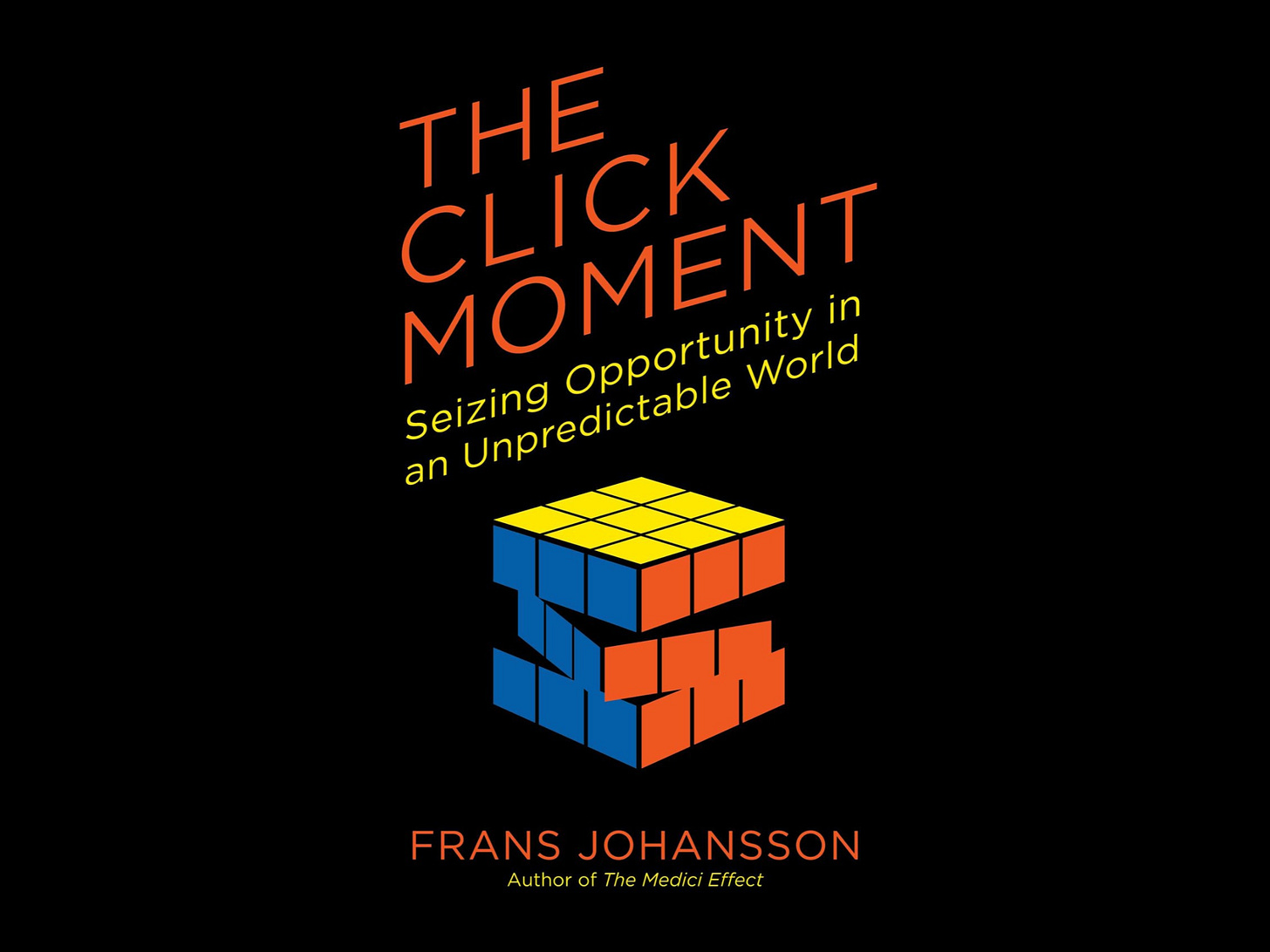The Paradox of Hard Work
How to Embrace the Randomness of Click Moments
Since January of 2020, Great Books, Great Minds has provided subscribers community, connection and conversation around books for free—no paywall.
But our future relies on you. At $6.00/month or $60.00 per year, please help me sustain our vision of impacting one million readers worldwide by 2030.
Diamond Michael Scott, Global Book Ambassador and Influencer
Frans Johansson's book, “The Click Moment: Seizing Opportunity in an Unpredictable World,” is like a defibrillator shock to the heart of everything we’ve been taught about success.
For as long as I can remember, we’ve been fed the narrative that hard work is the golden ticket to achievement. Put in your "10,000 hours," grind every day, hustle, hustle, hustle. But Johansson rips the lid off this comforting illusion and exposes a much starker reality: success is often random—far more random than we’d like to admit.
In a world of infinite unpredictability, it isn’t hard work alone that makes you a star; it’s those serendipitous moments—the click moments—that change everything.
As Johansson notes in the book introduction:
“This book is about two very simple but highly provocative ideas. The first one is this: success is random, far more random than we have come to believe. The second is that there are a number of specific actions that individuals and organizations can take to capture randomness and focus it in our favor. The reason people tend to consider these ideas provocative is because success, we are often told, is a result of strategy, planning, and careful analysis. Luck, on the other hand, is a force that lies outside of our control. This book rejects these conventional perspectives and proposes a useful and compelling alternative.”
One of my favorite excerpts from the book is when Johansson tells the story about the click moment that inspired Nike’s ascendancy in the world of athletic shoes.
He writes:
“Bill Bowerman, the legendary running coach, was having breakfast one morning with his wife while they discussed a thorny challenge he was grappling with: how to develop a spikeless sports shoe. Then he saw his wife pry a waffle from their six-inch art deco waffle iron. It was a fateful moment as Bowerman, without saying a word, sprinted back to his lab and returned with two cans of chemicals which, when mixed, created latex.”
He poured them into the waffle iron. Could the small “spikes” on a waffle grip the track without damaging it and also provide comfort to the runner? He poured three more latex waffles and combined them on one shoe. The answer was yes. The experiment worked. That one random moment represented a turning point for the shoe company and allowed the company’s CEO, Phil Knight, to build the foundation for an athletic apparel empire.”
I, too, have had my share of click moments—chance encounters that radically altered my life in ways I could never have planned for. We’ve all heard the stories of entrepreneurs who meticulously strategized their way to the top, but we rarely talk about those who stumbled upon success quite by accident. And that’s precisely the point Johansson makes.
Here’s the kicker though. If success is as random as Johansson suggests, then what are we doing grinding ourselves to the bone, believing that sheer force of will is our best shot?
Sure, hard work has its place, especially in structured domains with set rules—think chess, classical music, or sports. But in the business world and, frankly, in life, there are no steadfast rules. The idea that dedication alone will get you to the top is a myth, a relic from a bygone era when the world was less complex, less connected, and less random.
What Johansson exposes is that the “rules” of success are constantly being rewritten by randomness. Diane von Furstenberg didn't plan to revolutionize women's fashion by seeing Julie Nixon Eisenhower on TV. Howard Schultz didn't have a grand strategy when he decided to introduce lattes after visiting a café in Milan. And don’t even get me started on Nike’s waffle iron epiphany.
The common thread among all these success stories is unpredictability. They all encountered click moments—those rare, unexpected instances that alter the trajectory of life. And what separates the winners from the rest isn’t a master plan; it’s the ability to recognize these moments and pounce.
Think about it: if the world is so random, maybe the best thing we can do is court chaos. That means throwing away the playbook, placing purposeful bets, and embracing the unpredictable forces that shape our reality.
After all, who’s to say that the next big thing won’t come from a chance meeting, an offhand comment, or a bizarre experiment that nobody thought would work? If success were as simple as grinding through a formula, wouldn’t we all be millionaires by now?
Johansson’s provocative take hits home for me because it validates a hunch I’ve had for years: that life isn’t just a linear path where hard work equals success. It’s more like a cosmic dice roll, where a single throw can change everything.
The tragedy is that we often miss these click moments because we’re too busy keeping our heads down, grinding away, or following some outdated “10,000 hours” rule. If anything, Johansson challenges us to lift our gaze, be more opportunistic, and remain open to the unpredictable nature of life.
So, here’s my controversial stance: maybe we should stop glorifying hard work as the holy grail of success. Don’t get me wrong; I’m not saying we should all become slackers. But in a world as unpredictable as ours, it makes more sense to diversify our bets, to plant seeds in multiple fields, and to stay open to the magic of randomness.
Success isn’t about working harder; it’s about working smarter by being more attuned to those moments when everything aligns. As Johansson notes:
“The reality is that randomness rules our lives. Somehow we have always sensed this. The person we fell in love with, the deal we closed, the near miss—all of these involved serendipity, luck, and the utterly random. But today everything is changing so fast that randomness is not just a bug, it is the dominant feature in our lives and careers.
It has become the defining aspect of success. As we’ve seen, predictability has plummeted to an all-time low. Whatever plan or strategy we create in advance is sure to be wrong. Instead, success comes from the serendipitous meeting, the random insight, and the lucky bet.”
It’s time to abandon the predictable, safe route and dance with the randomness of life. Take more risks, meet more people, try more things. Keep your eyes peeled for those click moments, because when the world turns on a dime, you want to be ready.
And who knows? The next time life throws a curveball, it might just be the beginning of something extraordinary.
Since January of 2020, Great Books, Great Minds has provided subscribers community, connection and conversation around books for free—no paywall.
But our future relies on you. At $6.00/month or $60.00 per year, please help me sustain our vision of impacting one million readers worldwide by 2030.
Diamond Michael Scott, Global Book Ambassador and Influencer







This is a great point. I feel like some of the best opportunities I’ve stumbled upon involved being in the right place at the right time.
I try to mix work and social in a way that makes these chance encounters more likely. The mainstream work culture in the United States can be antithetical to the outcomes most workers hope to achieve.